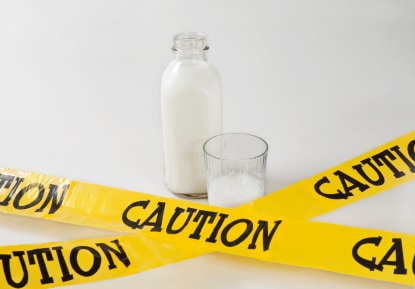
You’re Lactose Intolerant
More than two-thirds of adults worldwide have some degree of lactose intolerance. Deficiency in the enzyme lactase, which declines with age, makes it difficult to break down and absorb lactose sugars in dairy products such as milk and cottage cheese. When these sugars aren’t absorbed it can trigger bloating, gas and sometimes diarrhea.
Lactose intolerance can be diagnosed using a test called the hydrogen breath test. This involves drinking a beverage containing lactose and blowing into a container. If you exhale large amounts of hydrogen, chances are you’re lactose intolerant.
High tech aside, you can get a pretty good idea whether you’re lactose intolerant by keeping a food and symptom diary for a few weeks. Avoid lactose completely, and see if the symptoms get better. If you’re lactose-intolerant, the bloating should subside once you eliminate lactose-containing foods from your diet. If you still have a taste for dairy, there are lactose-free dairy products available that won’t cause you to bloat.
You’re Fructose Sensitive
Some people have difficulty digesting fructose, the sugar found in fruit, honey, and in processed foods and drinks that contain high-fructose corn syrup. People with fructose sensitivity experience bloating and gas when they consume modest amounts of fructose. This condition can be diagnosed with a breath test performed by a doctor.
The solution? Cut back on fructose-containing foods and beverages, and it should reduce the bloating. Sensitivity to fructose should not be confused with hereditary fructose intolerance, which is a more serious condition. Hereditary fructose intolerance is usually diagnosed during childhood.
You’re Wheat Sensitive
About one in a hundred people suffer from celiac disease. Celiac disease sufferers experience a wide range of symptoms, both intestinal and non-intestinal when they eat foods containing gluten. Gluten is found in barley, wheat, rye, and some oats and in many processed foods.
Some of the more common symptoms of celiac disease are bloating, abdominal discomfort and diarrhea. If you experience a combination of these symptoms, see your doctor for blood testing. Eliminating gluten from your diet should reduce the bloating and other intestinal symptoms.
You Have Irritable Bowel Syndrome
Irritable bowel syndrome is a functional condition that affects up to 20% of the population. People with this condition experience abdominal cramping, bloating, gas and diarrhea and constipation that come and go. Since the symptoms are frequently worsened by stress, stress reduction techniques sometimes help. If not, dietary changes and natural treatments such as peppermint oil to relax the intestinal tract may help. There are also prescription medications that work for some people.
You’re Stressed Out
People who are anxious sometimes swallow too much air when they eat and at other times as well. All of that trapped air can lead to abdominal bloating, distension and gas. If you burp a lot after a meal or experience frequent bouts of hiccups after eating, you may be a habitual air swallower. Slow down when you eat and limit the time you spent talking during a meal. Talking while eating can trigger air swallowing. Avoid carbonated beverages, straws, and don’t chew gum. Some people that swallow air get relief from over-the-counter tablets that contain simethicone. Ask your pharmacist about these.
The Bottom Line?
If you’re experiencing bloating after meals, keep a food diary for a few weeks. This helps to identify any food sensitivities that might be contributing to the problem. If it’s a persistent problem, see your doctor to rule out more serious causes of abdominal bloating.
References:
Merck Manual of Diagnosis and Therapy. 2011.
Related Articles By Cathe:
5 Common Reasons Women Experience Abdominal Bloating
6 Common Causes of Water Weight Gain
That Stubborn Abdominal Pooch! Surprising Reasons Your Abs Aren’t Flat
Is Belly Bloating Hiding Your Six-Pack? Find Out What Causes It and How to Deal With It

